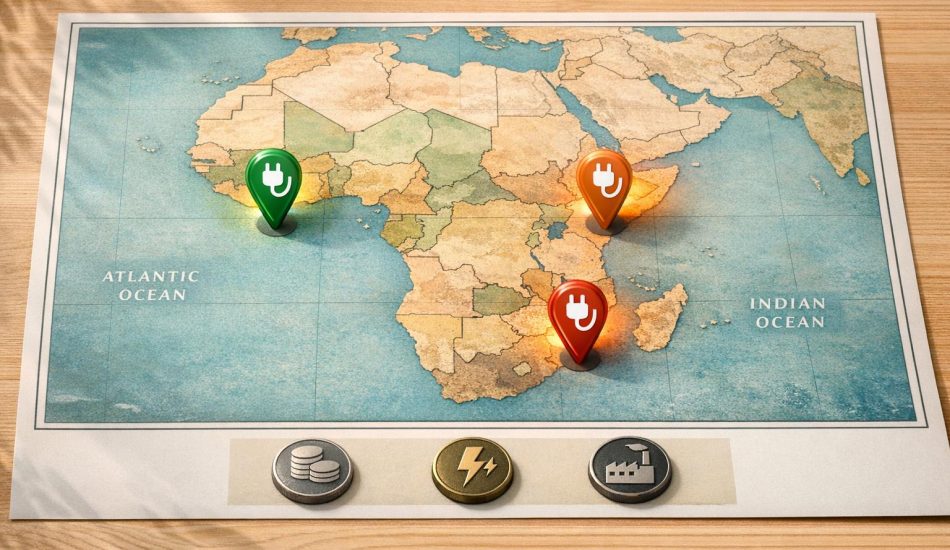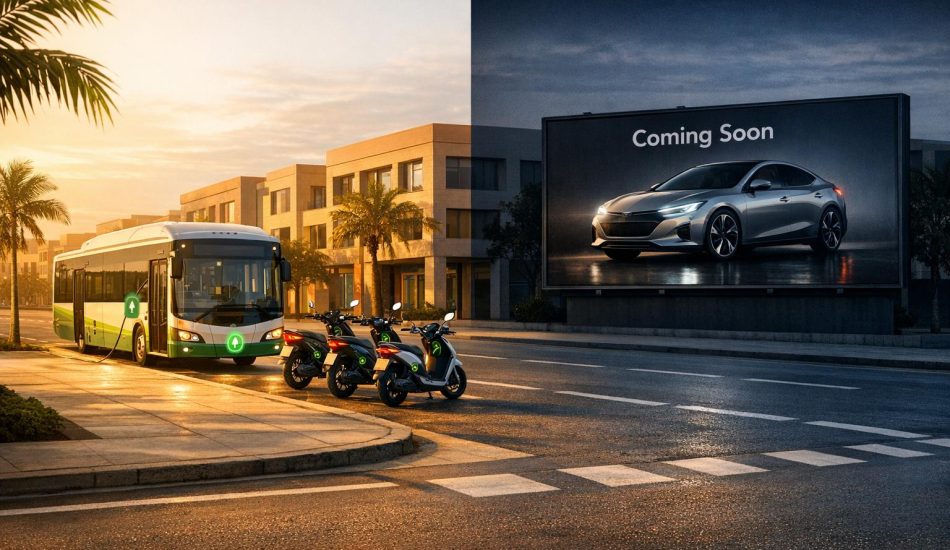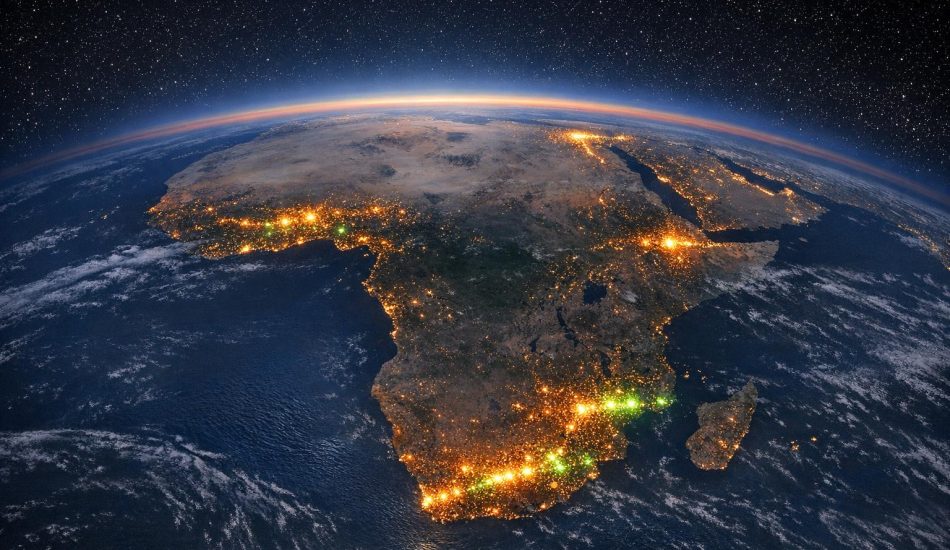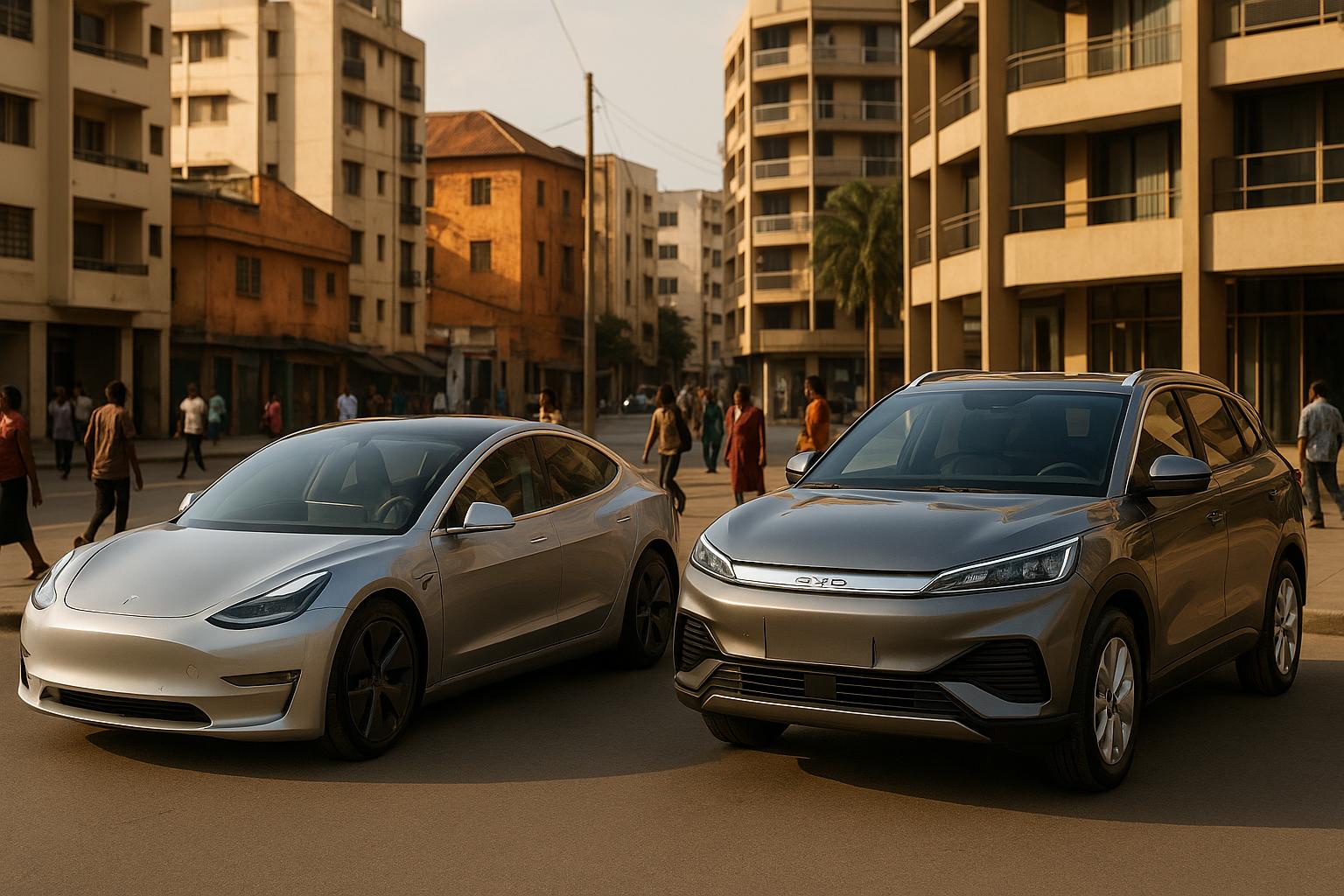
Africa’s electric vehicle (EV) market is growing, but challenges like high costs, limited infrastructure, and scarce local manufacturing make it a tough landscape. Tesla and BYD are two major players with very different strategies. Here’s the key takeaway:
- Tesla: Targets Africa’s wealthier consumers with high-tech, luxury vehicles. However, its steep prices, heavy import taxes, and reliance on proprietary charging stations limit its reach.
- BYD: Focuses on affordability, practical features, and compatibility with standard charging systems. Its local partnerships and financing options make it more accessible for a broader audience.
Quick Comparison:
| Factor | Tesla | BYD |
|---|---|---|
| Price | Expensive, starting at $57,000 | Budget-friendly, entry-level models |
| Infrastructure | Limited Supercharger network | Compatible with standard chargers |
| Market Focus | Premium, high-income buyers | Middle-class affordability |
Tesla shines as a luxury brand but struggles with accessibility, while BYD’s cost-effective approach better aligns with African consumers’ needs. Platforms like EV24.africa are bridging the gap by offering flexible financing and transparent pricing for both brands.
BYD Dolphin Review: Is This SA’s Best Value EV?
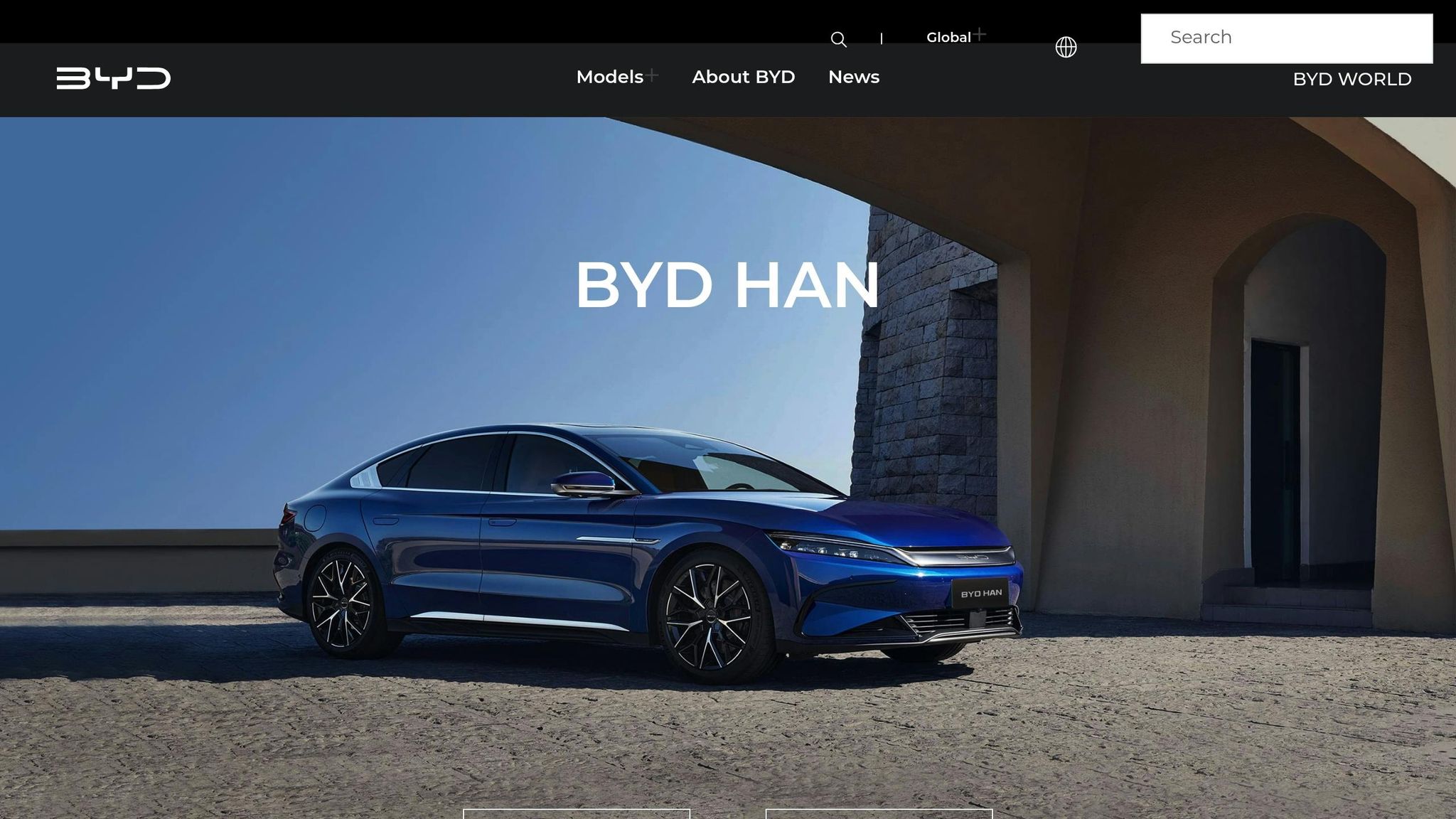
Tesla: Premium Brand Status in African Markets
Tesla has established itself as the global benchmark for electric vehicles, and this reputation extends to African markets. Known for its cutting-edge technology, sleek design, and focus on environmental responsibility, Tesla appeals to a growing segment of consumers. However, its premium positioning also highlights challenges when considered against Africa’s diverse economic landscape.
Tesla’s Luxury Appeal in Africa
In Africa, Tesla vehicles are more than just cars – they are symbols of wealth, innovation, and environmental awareness. For many in the middle and upper classes, owning a Tesla represents a commitment to sustainability and a taste for advanced technology. Features like autonomous driving, over-the-air updates, and striking design aesthetics add to the brand’s allure. Elon Musk’s association with the company further enhances its prestige. Yet, while Tesla’s appeal is undeniable, its high price tag makes it an aspirational purchase for most. This exclusivity underscores Tesla’s luxury image but also limits its accessibility to a broader audience.
Barriers: Pricing and Infrastructure
Tesla’s premium pricing is a significant hurdle. For instance, the Model 3, priced at $57,000, is far beyond reach for many African consumers. To put this into perspective, Morocco’s GDP per capita is around $3,000, making the cost of a Tesla nearly 19 times the average annual income.
South Africa paints a similar picture. A 25% import duty and an additional luxury tax of roughly $13,300 inflate the Model 3’s price by about 67% compared to its UK price. This means Tesla vehicles in South Africa face a total tax burden of approximately 58.88% of their landing price, higher than the 51.72% faced by vehicles with lower import duties.
Infrastructure challenges further complicate Tesla’s expansion. As of August 2025, Tesla Supercharger stations in Africa are limited to Morocco, with just six stations spread across cities like Tangier, Casablanca, and Marrakech. This sparse network makes long-distance travel impractical and restricts Tesla’s appeal to urban areas with reliable electricity.
Adding to these obstacles is the lack of meaningful government incentives for electric vehicles. Without financial support, African consumers bear the full brunt of Tesla’s steep costs, making the vehicles even less accessible.
These combined factors – high pricing, steep import taxes, limited charging infrastructure, and minimal governmental backing – cement Tesla’s position as a luxury brand in Africa, rather than a practical option for the majority of the population.
BYD: Budget-Friendly Options for African Buyers
While Tesla is often associated with high-end pricing, BYD has carved out a niche as a more affordable choice for African consumers. The Chinese automaker focuses on making electric vehicles (EVs) accessible and is steadily building a strong foothold across the continent.
BYD’s Affordable Models and Growing Presence
BYD caters to Africa’s growing middle class by offering entry-level models at prices that are easier on the wallet. To further reduce costs and boost local economies, the company is considering local assembly plants – an initiative that could also create much-needed jobs. Additionally, BYD provides plug-in hybrid models, a practical solution for areas where charging infrastructure is still developing. This cost-conscious strategy is backed by reliable local support, which plays a key role in building trust and expanding its market reach.
Strengthening Local Ties and Customer Support
BYD is actively forming partnerships and prioritizing customer support to ensure a seamless ownership experience. By expanding its network of dealerships and service centers, the company guarantees dependable after-sales care. It also works closely with local distributors and trains technicians to establish a reliable service ecosystem. To make its vehicles even more accessible, BYD has introduced financing programs and mobile maintenance units, helping to provide convenient service and support across diverse regions.
sbb-itb-99e19e3
Tesla vs. BYD: Side-by-Side Comparison for Africa
In Africa, two key factors stand out when it comes to electric vehicles: how easily the cars are available and the accessibility of charging stations. Tesla’s global reputation is impressive, but it struggles to make a significant impact on the continent due to its limited presence and reliance on a sparse Supercharger network. On the other hand, BYD is making strides by forming local partnerships and ensuring compatibility with standard charging systems.
Availability and Charging Infrastructure Comparison
| Factor | Tesla | BYD |
|---|---|---|
| Vehicle Availability | Limited direct distribution partnerships across African markets | Building dealership networks through strategic local collaborations |
| Charging Infrastructure | Relies on a restricted Supercharger network | Works with existing, widely available standard charging solutions |
BYD’s approach – focused on increasing accessibility through local partnerships and leveraging existing charging systems – makes it a more practical choice for African consumers. In contrast, Tesla’s premium offerings face challenges in reaching a broader audience due to limited infrastructure and distribution. These differing strategies highlight how each company is tackling the unique demands of the African market, offering valuable insights into consumer preferences and the pace of EV adoption across the continent.
African EV Market Trends and Online Platforms
EV Adoption Growth and Infrastructure Development
Africa’s electric vehicle (EV) market is steadily growing, even as it faces several hurdles. Governments in countries like South Africa, Kenya, and Morocco are stepping up with incentives and expanding charging infrastructure to encourage adoption.
While charging networks remain sparse in some areas, cities such as Cape Town, Nairobi, and Lagos are making strides by investing in public charging stations. These developments play a key role in shaping consumer perceptions of EV brands like Tesla and BYD. For example, Tesla’s reliance on its exclusive Supercharger network can limit accessibility in regions without this infrastructure. By contrast, BYD vehicles are compatible with standard charging systems, offering a more adaptable solution for African markets.
Several African nations are also revising import policies and tax structures to make EVs more accessible. Reductions in import duties on electric vehicles are one such measure, helping EVs compete more effectively with traditional gasoline-powered cars. Platforms like EV24.africa are well-positioned to support these shifts by providing flexible sales channels. These changes bolster BYD’s reputation as a cost-conscious option, while Tesla’s higher price tags remain a challenge for many buyers in the region.
The growing middle class in Africa’s urban centers represents a promising market for EVs. However, limited consumer awareness about electric vehicles highlights the need for better communication of each brand’s benefits. These dynamics create opportunities for platforms that simplify EV access and educate consumers across the continent.
EV24.africa‘s Role in Improving Vehicle Access
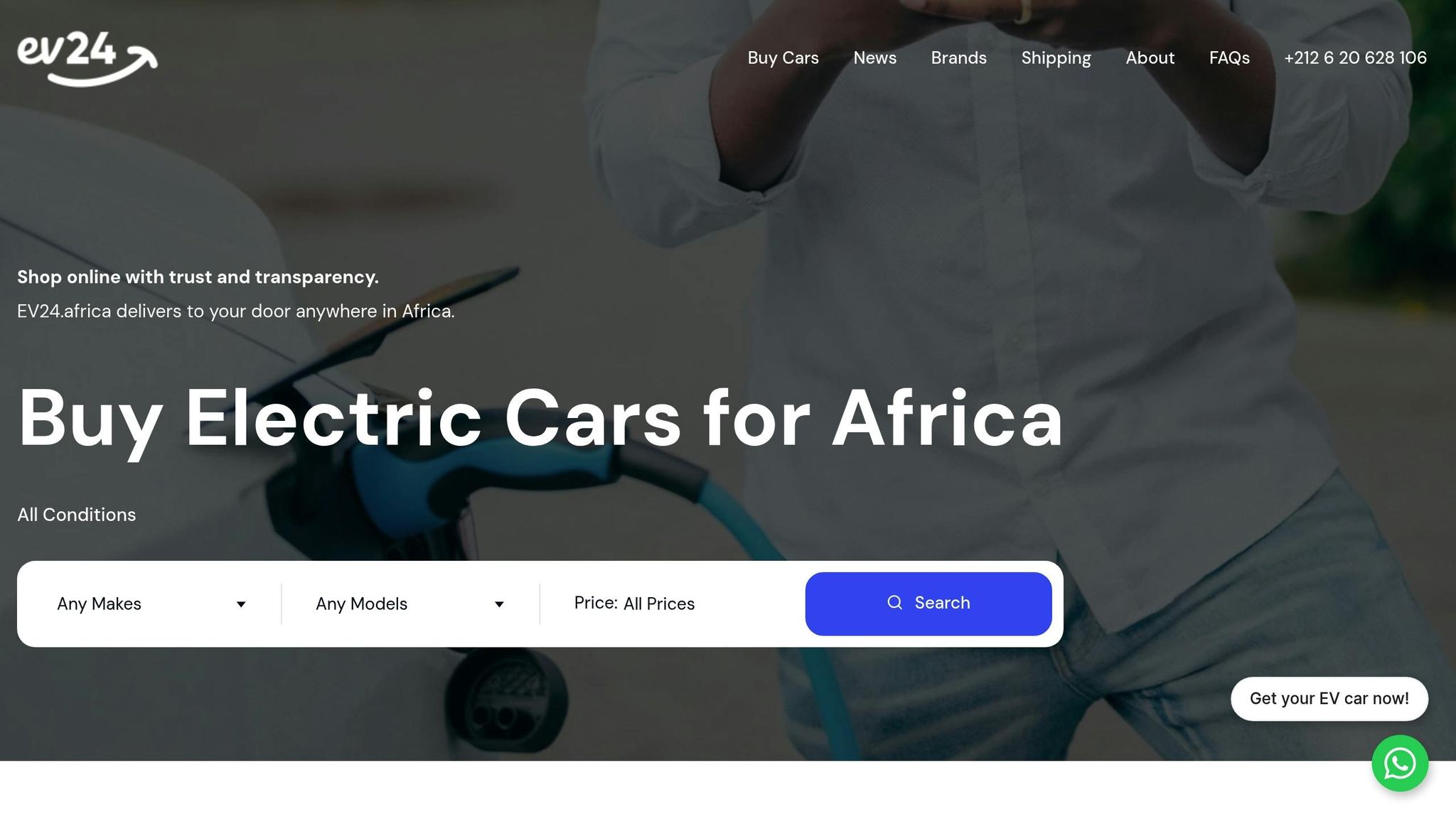
As EV adoption picks up pace, online platforms are becoming crucial for connecting international EV brands with African consumers. EV24.africa is one such platform, addressing many of the obstacles that traditionally hinder EV adoption in the region.
The platform offers a diverse range of vehicles, including models from Tesla, BYD, and other manufacturers like Leapmotor, Geely, and Hyundai. This variety allows consumers to easily compare features, prices, and availability without the hassle of visiting multiple dealerships or dealing with complicated import processes.
One of EV24.africa’s standout features is its transparent pricing model, which eliminates uncertainty in a market where pricing can often be unclear. By providing upfront costs, the platform builds trust and confidence – critical factors for buyers considering high-value purchases like EVs.
With delivery options to all 54 African countries and flexible financing plans, EV24.africa addresses regional availability challenges head-on. Its payment solutions make premium brands like Tesla more attainable while also appealing to budget-conscious buyers considering BYD. By combining transparent pricing, diverse options, and flexible payment terms, EV24.africa plays a key role in making EVs more accessible to a wider audience in Africa.
Conclusion: Tesla vs. BYD Brand Comparison Results
Our analysis highlights two contrasting approaches to electric vehicle adoption in African markets. Tesla leans heavily on its cutting-edge technology and exclusive services to uphold its premium image. However, the high price tag attached to Tesla’s offerings limits its accessibility for a broader audience.
On the other hand, BYD focuses on affordability and practicality, aligning its strategy with the needs of many African consumers. This approach makes BYD a more realistic option for those seeking cost-effective solutions without compromising on functionality.
Platforms like EV24.africa are playing a pivotal role in bridging the gap between international EV brands and African buyers. By offering transparent pricing, flexible financing options, and pan-African delivery, EV24.africa simplifies the process of comparing models and making informed purchasing decisions.
FAQs
How do Tesla and BYD make electric vehicles more accessible to African consumers, and how do their strategies differ?
Tesla and BYD have chosen distinctly different paths to bring electric vehicles (EVs) to African markets. Tesla leans heavily into the luxury segment, offering premium EVs packed with advanced technology. While these vehicles showcase state-of-the-art features, their steep price tags often make them accessible only to a select, wealthier audience.
In contrast, BYD focuses on making EVs more affordable and practical. By offering cost-efficient models and teaming up with local businesses to enhance infrastructure and cut expenses, BYD appeals to a much broader group of consumers. Their strategy of forming local partnerships and maintaining competitive pricing has made EV ownership more attainable for everyday drivers.
Both companies are playing pivotal roles in expanding EV adoption across Africa, though their strategies target very different parts of the market – one prioritizing luxury, the other emphasizing affordability.
What obstacles does Tesla face in growing its presence in Africa compared to BYD?
Tesla is encountering several obstacles as it works to establish a stronger presence in Africa, with cost emerging as a significant challenge. Tesla’s vehicles come with a hefty price tag, putting them out of reach for many consumers in African markets. On the other hand, BYD has gained traction by offering more affordable electric vehicles, which resonate with a wider range of buyers.
Another issue for Tesla is its lack of local partnerships and infrastructure in the region. Essentials like charging stations and service centers are sparse, making ownership less practical for potential customers. BYD, in contrast, has taken a more active approach by collaborating with African companies and adapting its products to better align with local demands. This strategy gives BYD a clear edge in establishing a stronger presence across the continent.
How does EV24.africa make Tesla and BYD electric vehicles more accessible across Africa?
EV24.africa is making it easier than ever for people across Africa to own Tesla and BYD electric vehicles. They offer flexible financing plans, delivery to any location across the continent, and a variety of models to fit different preferences and budgets. Their straightforward online platform allows users to browse detailed listings and complete their purchases without hassle, bringing convenience and affordability to the EV market.
By reaching all 54 African countries, EV24.africa eliminates location barriers, connecting global electric vehicle brands with African buyers and expanding access to sustainable transportation options.


